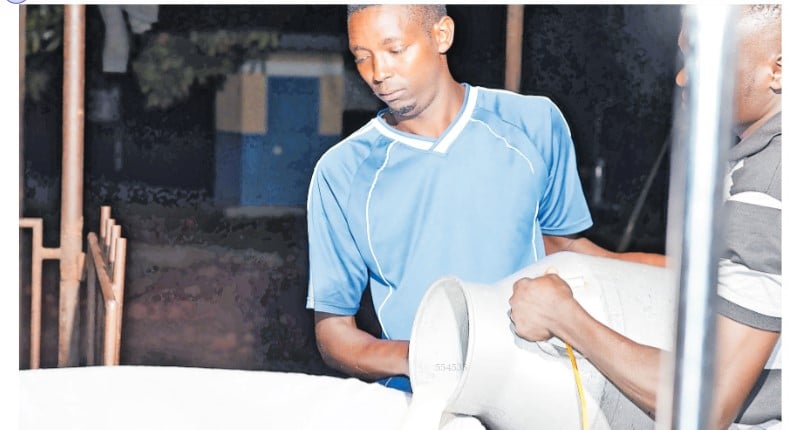Prime
Nine common construction challenges and how to deal with them

To ensure that your house is built with as few mistakes as possible, you may have to closely monitor your builders and avoid short cuts. Photo by Ismail Kezaala.
What you need to know:
It can be an exciting journey encounter, as well as a frightening challenge if you embark on building a house. Inevitably, so many things are bound to go awry but you can manage them with a few simple precautions.
For Eric Sabiti, a lawyer with Electoral Commission, the first challenge towards building his house in Jomayi-Nalumunye Estate was the painful habit of saving up for it.
“I had a good job but I had to stay in Makerere-Kavule,” he says of the place that is more of a slum. “I had one suit and one pair of shoes and I feared to take colleagues where I lived. Even when I would fall sick, I would keep it a secret because bosses would want to check on me yet I did not want them to know where I stayed.”
So slowly and painfully, he built his house. However besides the sacrifice people like Sabiti go through to raise the monies for this dream project, there are some thorns in the flesh of building a house that excruciatingly stab even those for whom money is not a problem. You, however, do not have to suffer the same pain, especially when it is your hard-earned money we are talking about. With wisdom gathered from a construction engineer and a few people that have lived and thankfully survived these ordeals, you can arm yourself with tools on how to navigate the murky waters of building your dream home.
1 - Poor workmanship
Lamech Kagoro, a communications analyst, always winces in pain whenever he remembers the undue cost he paid for the mistakes of the site engineer who came highly recommended from a trusted relative. There were bent walls that had to be pulled down at his own cost; “by the time the eye sees a bent wall, it is really bent. This meant more bricks, sand and cement besides the wasted time.
Well, Kagoro lost patience and fired his foreman when the whole shed had to be pulled down out of poor workmanship.
“I had paid him Shs 400,000 for labour and I had to pay this same amount again to the new builder on top of buying fresh materials which included five bags of cement, a trip of sand and bricks.”
For Farouk Kezaala, the roof of his house collapsed a few days before he moved in.
“Quite easily, my family would have been hurt or even killed because the whole roof came down,” Kezaala, whose house also has several cracks, says.
Apparently, the builder had not used enough cement the reason his house is in this shape.
Kagoro’s advice: “There are so many gamblers out there in the name of engineers. Look around for a house you like and ask for the contact of the person who built it.”
Eng Adam Bisoborwa of Adam Engineering Services in Gayaza says that signing a binding agreement instead of the verbal understanding many clients have with builders could go a long way in cutting losses caused by unqualified technicians. In this case, the builder pays in the event that anything goes wrong.
2 - Substandard materials
According to Eng Bisoborwa, the 12 mm twisted bars that are supposed to be used for re-inforcing ring beams have been fake over the past 15 years. Why? “Hardware owners have been making orders for 10 or 11 mm bars,” he explains. Because the difference of a few millimetres is virtually undetectable, you buy thinking that you have a bargain when in essence, you have been cheated.
“The structure can collapse,” the engineer warns of the imminent risks of using substandard materials.
Buying from trusted outlets like Hardware World or Seroma that have a name to protect will counter the possibilities of buying fake/substandard materials according to Kagoro.
3 - Inflated amount of materials needed
With hindsight, Sabiti wishes he had not trusted the site engineer as much.
“He was a menace who would exaggerate the materials needed to do a job,” Sabiti says.
Apparently site engineers like Sabiti’s will contact specific hardware shops and agree that when he brings a customer, it will be possible to bring back some of them in exchange for cash.
“So when you need say, 100 items, the engineer will ask for 200 and he will take you to a shop that he claims sells high quality materials and you pay,” Sabiti explains.
While you probably patting yourself on the back for finding out the correct market price prior, the engineer will be smiling all the way back to the shop having outsmarted you by pocketing half of your expenditure.
4 - Find time to supervise
Do you find a jobless relative? It is time to pay him/her a small fee to manage your site according to Kagoro whose ideal would be to employ a construction company like Roko.
“This person will keep an eye on the store give you a report about what is happening,” he points out adding that the beauty of a construction company is that you simply wait for a finished product as stipulated by your binding agreement without the hustles of supervision. Close supervision will reduce on the losses due to outright theft at the site.
5 - Slow progress
Builders can be hired under different terms. Some clients pay a uniform sum for a completed project while others pay per day. And as Kagoro who was using the latter found out, builders do not really care about what you are spending.
“If they did not have any other site to work on, they would dilly-dally knowing that each day that went by meant money in their pockets. I discovered this trick when it was too late,” he says.
Paying an agreed upon sum for the project is much wiser.
6 - Outright theft of materials from the site
With busy schedules, finding time to buy materials can be hard but knowing that money can be saved, some people try thereby blocking any opportunity for cheating foremen or builders to make a difference by purchasing under-quality or fewer materials. However this is not a deterrent for hardhearted builders. Left unsupervised for a few hours, a bag of cement or a metal bar will grow wings. If not, since they know their way around the site, they will come back in the dead of the night to steal. Knowing this, Sabiti hired an askari (watchman). This however did not save him because the askari connived with the builders when he had just secured roofing materials. They stole the materials at night and the following day, he found the site store open; there was neither askari nor builders. He had to acquire more money to roof his house.
7 - Wastage of materials
Charles Mugizi still has some 500 bricks lying idle in his compound. These are among other items which the contracters requested for but never used like electric switches and lamp holders.
“It is such a waste because I now have to look for buyers and all for the money I put it,” he laments.
His advice is that you should have a rough idea about the amount of materials you need, for example, count the number of switches you will need around the house instead of relying on the site engineer all the time.
8 - Beware of Cheap Labour
To win a deal, some constructers will ask for less money with a motive of making up for it through other means. Kagoro says it is much better to pay a high price whilst getting exactly what you want instead of getting a substandard house at the end of the day. He uses the technicians he employed as an example.
“The first one asked me for very little but he would use say, two bags of cement instead of three. This was his plan of covering up. The second was very expensive but he was honest and he did a good job.”
While wiring his house, Kezaala got someone, who apparently had contacts in Umeme to pursue the bureaucratic process on his behalf at a small fee. He got electricity and was quite happy with himself until Umeme staff turned up.
“They said I was illegally connected. They disconnected me, threatened with me legal action, fined me and instructed me to pursue the process afresh. They even threatened to seize my electricity pole.”
Kezaala says he has spent more money than he would have if he had gone through the ‘time-consuming’ procedure himself.
9 - Take precaution to avoid damages
Whether it was because they were transported carelessly on the bumpy road to his home or that they were packed while broken, Mugizi will never know but a third of the tiles he bought were broken.
“10 out of the 30 boxes had broken tiles. It was such a big loss,” he says.
This also goes back to making certain that you buy from outlets that have a name to protect.
So while you save up for your dream house, make a mental note of how you are going to deal with these issues.




